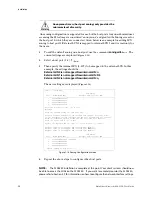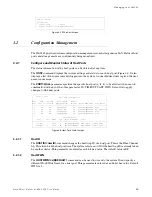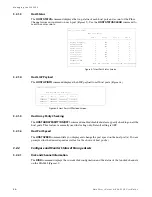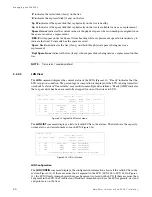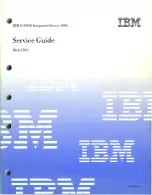
38
D a t a D i r e c t N e t w o r k s S 2 A 9 5 5 0 U s e r G u i d e
M a n a g i n g t h e S 2 A 9 5 5 0
The
DISK RLS=<tier><channel>
command displays Read Link Error Status Block information for the
specified drive. If neither the tier nor the channel is specified, the RLS information is requested from
all drives. If only the channel is specified, information is requested from all drives on that channel.
If only the tier is specified, information is requested from all drives on that tier. The RLS information
consists of the following items which is not shown on the screen:
Link:
Link Failure Count
Sync:
Loss of Synchronization Count
Signal:
Loss of Signal Count
PSPE:
Primitive Sequence Protocol Error
ITW:
Invalid Transmission Word
CRC:
Invalid CRC Count
F7Init:
Lip F7 initiated count
F7Rec:
Lip F7 received count
F8Init:
Lip F8 initiated count
F8Rec:
Lip F8 received count
The
DISK RLSSYNC
command saves the current Read Link Error Status Block information for all the
drives.
The
DISK RLS
command requests and displays the Relative Read Link Error Status Block
information for all the drives or for the specified drive. It shows the difference between the current
information and the saved information which was saved using
DISK RLSSYNC
command.
The
DISK FAIL=<tier><channel>
command instructs the system to fail the specified disk at the
physical tier in the range of 1 through 125 and channel in the range of ABCDEFGHPS. When a non-
SPARE disk is specified and it is failing, the disk won’t cause a multi-channel failure. The disk is
marked as failed. An attempt is made to replace it with a spare disk. When a SPARE disk is specified
and it is currently in use as a replacement for a failed disk, the disk that the spare is replacing is put
back to a failed status and the spare is released, but marked as unhealthy and unavailable.
For other DISK parameters, see 3.2.10.3.
3.2.2.2
Tier View
Tiers are the basic building blocks of the S2A9550. One tier contains ten drives: eight data drives
(Channels A through H), one parity drive (Channel P), and an optional spare drive (Channel S).
Drives that have the same AL_PA across all ten channels are put on the same tier. The tier that
contains the drives with the highest AL_PA value is recognized as Tier #1. Tiers are automatically
added to the system when the disks are detected. A tier will automatically be removed if it is not in
use by any of the LUNs and all of the disks in the tier are removed or moved to another location.
The
TIER
command lets you display the current status and configuration of the tiers in the system
.
Number of defects in P List = 672
Figure 3-11 Disk Defect List Screen
S2A [1]: disk defectlist=1a
Number of defects in G List = 362
S2A [1]:
Summary of Contents for S2A9550
Page 1: ...DataDirect Networks Silicon Storage Appliance S2A9550 User Guide Rev 4 0 ...
Page 13: ...SECTION 1 Introducing the S2A9550 ...
Page 14: ...This page intentionally left blank ...
Page 21: ...SECTION 2 Installing the S2A9550 ...
Page 22: ...This page intentionally left blank ...
Page 24: ...Installation 12 DataDirect Networks S2A 9550 User Guide This page is intentionally blank ...
Page 43: ...SECTION 3 Using the S2A9550 Management Administrative Facilities ...
Page 44: ...This page intentionally left blank ...
Page 93: ...SECTION 4 Supporting the S2A9550 ...
Page 94: ...This page intentionally left blank ...
Page 113: ...SECTION 5 Appendices ...







